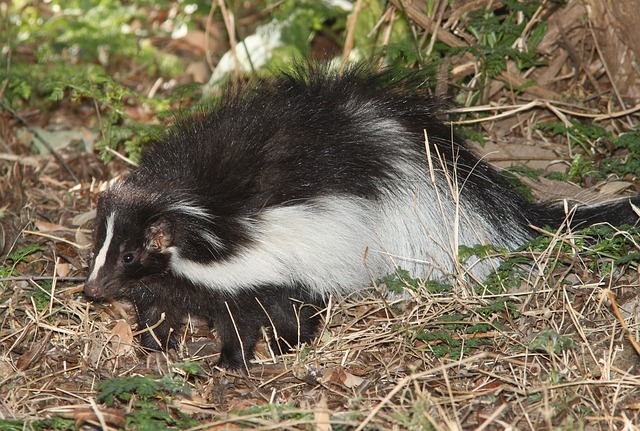It happens to pet parents everywhere; your dog is playing outside, you see a flash of black and white, your dog runs toward it as you desperately call his name, and then “pshhh!”… he gets sprayed by a skunk!
So, now what do you do? You may be unsure about the old “tomato juice bath” trick, and you may even be concerned about whether you should call the vet. Below, here are the steps to take after your pooch gets skunked.

1. Keep your dog outside or in a contained area
Keep your pup in the yard (and contained) or in the garage if possible. You don’t want that pungent smell to waft in through the house, plus keeping him in one spot will help you evaluate the situation and prepare him for a bath. Remember, your dog may still be in a frenzy from the incident, and could start zooming through your home, or worse, get spooked and run away.
Petful adds to keep your canine away from furniture and change into clothes that you don’t mind destroying with the stink.
2. Determine if your dog got sprayed in the eyes, scratched, or bitten
If your pup gets sprayed, one of the first things you should do is evaluate whether the liquid got in his eyes. The substance, which contains sulfurous chemicals called thiols according to the American Kennel Club (AKC), can severely irritate the eyes.
Although your dog will be blinking and rubbing them, The Spruce suggests flushing them out with copious amounts of cool water or saline solution (the kind that can be used directly on the eye, not the contact lens cleaner). The more your dog rubs and scratches his face, the higher chance that he could injure himself. If the irritation doesn’t subside, a trip to the vet is most certainly in order.
Your other priority should be to check for open wounds from scratches or bite marks. If there was an altercation and the skunk broke your dog’s skin, you should definitely call the vet. (More on that below.)
3. Soak up the spray ASAP
Grab a pair of rubber gloves. Use paper towels to absorb as much of the chemical off your dog’s fur as you can, and do this as soon as possible. Patting is better than wiping, which can spread the smell around to areas that haven’t been sprayed.

4. Mix up a homemade cleaning solution.
In addition to making a huge mess, the “tomato juice” treatment may make your dog stink less like a skunk… but more like tomato! Instead, Petful suggests mixing up the following solution in an open container (it could explode if put in a closed container):
- 1 quart 3 percent hydrogen peroxide (new, unopened bottle)
- ¼ cup baking soda
- 1–2 teaspoons liquid soap (Dawn is effective because it cuts grease)
Don’t forget to keep your gloves on! And if you’re dog’s collar got hit with the spray, leave that on too. Any extra solution should be disposed of and NOT saved.
You can also prepare ahead of time and purchase de-skunking products to keep on hand, in case your pooch decides to let his curiosity get the best of him!
5. Apply the mixture to fur, but avoid his face and eyes.
Lather your pup with the homemade “de-skunking” bath and let it sit for at least 5 minutes to soak up the smell. Rinse, then wash with his regular shampoo.
If he’s still got some spray on his face, use eye-safe saline solution (not the kind used only to clean contacts!) and cool water. Petful says that milk may also be an effective cleaning liquid for the face.
When to be concerned:
If it appears that your pup has been bitten or scratched by the skunk, he should definitely take a trip to the vet as soon as possible. Skunks can carry rabies, so watch for these signs, according to PetMD:
- Pica
- Fever
- Seizures
- Paralysis
- Hydrophobia
- Jaw is dropped
- Inability to swallow
- Change in tone of bark
- Muscular lack of coordination
- Unusual shyness or aggression
- Excessive excitability
- Constant irritability/changes in attitude and behavior
- Paralysis in the mandible and larynx
- Excessive salivation (hypersalivation), or frothy saliva
Petful also mentions that smaller dogs may have symptoms resulting from skunk spray exposure, depending on how much they inhale. And as mentioned above, any residual eye irritation or injury following the encounter should be checked out by a professional.
The bottom line: if your dog isn’t acting like himself after his bath or has any open wounds, call your vet immediately to be on the safe side. Hopefully you’ll never have to use these tips with your pup – but they’re good to know, just in case!
Has your dog ever been sprayed by a skunk, and do you have any advice on how to deal with it? Share with us in the comments below!
(H/T: Petful )
